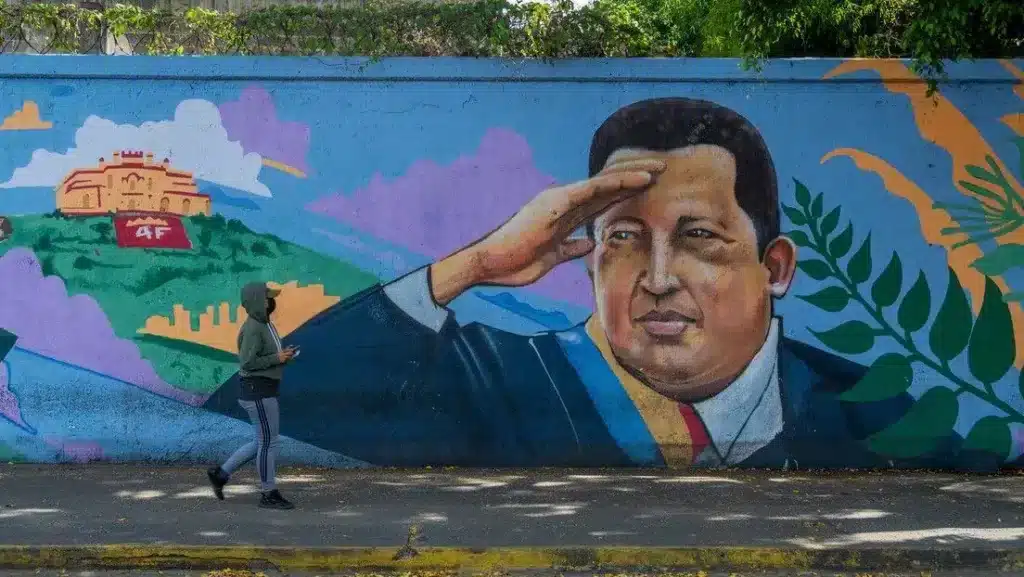
A woman walks past a mural of Hugo Chavez in Caracas, Venezuela, May 29, 2022. Photo: Jimmy Villalta/ZUMA Press Wire/Legion-Media.

Orinoco Tribune – News and opinion pieces about Venezuela and beyond
From Venezuela and made by Venezuelan Chavistas

A woman walks past a mural of Hugo Chavez in Caracas, Venezuela, May 29, 2022. Photo: Jimmy Villalta/ZUMA Press Wire/Legion-Media.
By Carmen Parejo Rendón – Aug 20, 2025
“We will defend our independence with all the means at our disposal and we will raise our protest before the Spanish nation and its intelligent people, who we believe do not dispute the legality of our demands,” said Abd el-Krim, a Riffian revolutionary leader who resisted French and Spanish colonial occupation in the early 20th century. These words, which distinguish between the power that oppresses and the people who can understand and resist, resonate today more strongly than ever from Venezuela. Because Venezuela is not only a country beset by imperialism: it is an ethical, political, and cultural trench in the midst of a world collapsing amid wars, genocides, recycled fascisms, and markets that devour peoples.
Defending Venezuela is not a slogan of distant solidarity: it is an act of political affirmation. It is deciding whether we are on the side of the peoples who create life in the midst of siege, or on the side of those who put a price on dignity.
From the outset, the Bolivarian Revolution was singled out as a threat by imperialist power. Not because of its mistakes, nor even because of its successes (there was hardly time for that), but because of its audacity: talking about socialism and, above all, trying to build it, not only in a historically plundered continent like Latin America, but in a world that boasted of the “end of history” after the capitalist victory in the Cold War and the disintegration of the socialist bloc.
In that new century, when only one besieged Caribbean island—Cuba—seemed to resist, it was that same Caribbean Sea that wove a revolutionary continuity between the Cuban example and a new step forward in the transformation of the world.
From the outset, the Bolivarian Revolution was singled out as a threat by imperialist powers. Not because of its mistakes, but because of its audacity: talking about socialism.
In response, the 2002 coup against Hugo Chávez was the beginning of a long, multifaceted, and sustained war that includes sabotage, economic blockade, media warfare, financial terrorism, financed street violence, disregard for legitimate electoral processes, and the imposition of a “parallel government” without legitimacy. Thus, for more than two decades, Venezuela has been the target of a strategy of encirclement to suffocate its popular process and warn the rest of the world what happens to those who dare to disobey.
However, in the face of each imperialist onslaught, the Bolivarian process not only resisted from the state: it did so from below, from the living fabric of the organized people. Where the market was suffocated by the blockade and where institutions were delegitimized by the global media and political machinery, circuits of local sovereignty, self-management and community life emerged.
Because the most disruptive aspect of the Venezuelan process is that the political subject of transformation goes far beyond institutions: it is popular, deeply rooted in everyday life, and therefore more difficult to curtail. The communes not only produce food and essential goods: they produce awareness, solidarity, and real power. And alongside them, the civil-military union—one of the great strategic breakthroughs of Chavismo—which ruled out the possibility of applying in Venezuela the same coup script that was executed in Chile against Salvador Allende. In the midst of the siege, the Venezuelan people demonstrated that a revolution does not survive by decree or by speeches, but because the people take center stage. It is this people who, with all the contradictions of any living process, keep a concrete utopia alive, and they do so not out of nostalgia for the past, but out of a clear intuition of the future. And that—the example—has not been forgiven, nor will it ever be forgiven, in Venezuela.
In recent days, we have witnessed a new escalation in imperialist policy toward the Bolivarian Republic: Donald Trump has raised the reward for the capture of Nicolás Maduro to $50 million, doubling the amount offered by the Biden administration and setting the highest amount ever allocated against a foreign head of state. This is not a symbolic provocation, but rather operational criminalization: the Department of Justice, under the direction of Attorney General Pam Bondi, accuses Maduro of being “one of the world’s largest drug traffickers.” This narrative, articulated with an expanded version of the “anti-drug doctrine,” could “legitimize” extraterritorial military actions under the pretext of security.
But beyond the obvious cynicism, what is revealing is that this war rhetoric—with rewards, posters, and military deployment—comes from a country experiencing its own drug addiction epidemic, fueled by marginalization, poverty, and social breakdown. Instead of addressing the structural causes of mass opioid and fentanyl consumption, the US government uses the pain of its own people as fuel to justify external interference and, probably, reinforce internal repression. A despicable game in which domestic tragedy is not resolved, but rather exploited for macabre purposes.
We live in a world of confrontation between a center clinging to its declining power and a periphery rising up with new forms of sovereignty and cooperation. This war is not only against Venezuela. It is against everything that escapes the script of subordination.
This has also been confirmed in recent days by Brazil, on which the US has just imposed 50% tariffs in an act of direct economic and political punishment. Hopefully, this blow to its sovereignty will prompt Lula’s government to lift, once and for all, the shameful veto on Venezuela’s entry into the BRICS.
India is also learning this lesson, having received its own share of tariffs and now finding itself forced to rethink its alliances: resolving its tensions with China and unambiguously integrating into a multipolar world seems less and less like an option and more like a necessity. Because what is at stake is not only economic hegemony, but the right to build its own models of development and social justice.
Meanwhile, if we zoom out, we see how the global order is teetering amid ominous signs: a Europe that is recycling the worst of its history with the return of militarism and fascism; collective impotence in the face of a televised genocide such as that of the Palestinian people; and the shameless arrogance of leaders such as Trump and his henchmen, who unabashedly show themselves to be true enemies of life.
Defending Venezuela today is much more than a question of borders or ideological affinities with its revolutionary process. It is, in reality, taking sides in the dispute over the very meaning of the world we want to build. When a popular process is persecuted, blocked, or criminalized for daring to imagine another model, what is at stake is not just a country: it is the possibility of a future. What we face is not only economic domination, but a global order that needs subordinates.
Returning to Abd el-Krim, beyond the different states, the peoples of the world have an obligation to understand and resist. Because if we do not, we will continue to live in a world where wars are celebrated, genocides are broadcast live, and dignity is put a price on. Defending Venezuela is also defending ourselves as part of a shared humanity.

Carmen Parejo Rendón is a writer and analyst for various audiovisual and written media. She is the director of the digital media Revista La Comuna. She collaborates with Hispan TV and Telesur. Her work is focused on the study and analysis of the Latin American and West Asian reality.
Support Groundbreaking Anti-Imperialist Journalism: Stand with Orinoco Tribune!
For 7 years, we’ve delivered unwavering truth from the Global South frontline – no corporate filters, no hidden agenda.
Last year’s impact:
• More than 250K active users demanding bold perspectives
• 280 original pieces published in 2025 alone
Fuel our truth-telling: Every contribution strengthens independent media that challenges imperialism.
Be the difference: DONATE now to keep radical journalism alive!